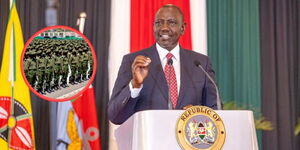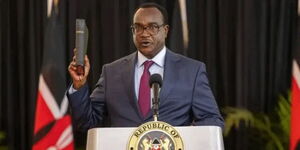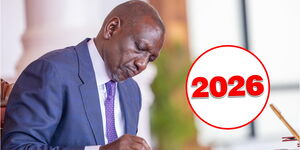Digital Strategist and Head of Creative Economy at the Office of the President, Dennis Itumbi, has responded to the Anglican Church of Kenya's Archbishop Jackson Ole Sapit on who will be the bishop of the State House church, which is currently under construction.
In a long-winded statement on Saturday, July 5, Itumbi expressed his surprise at Sapit’s question, giving a historical breakdown of the link between the State House, the Church, and the overall Christian religion.
Sapit on Friday, July 4, expressed his dissatisfaction with the construction of the church, questioning whether President William Ruto would be the Bishop of the new church.
However, Itumbi explained that by design, Ole Sapit was supposed to be the bishop of the new State House church and the overall National Chaplain.
“Your Grace, my Archbishop, Most Reverend Ole Sapit, you do not need to ask who should be the State House Bishop. By tradition, geography, and divine proximity, you already are,” Itumbi asserted.
Historical context
Itumbi, in his explanation, revealed that when the British colonialists constructed State House, they also deliberately carved out a premium parcel of land right next to Gate A. He referred to this land as the Archbishopbourne.
As per Itumbi, the intention was deliberate; the Archbishop of the Anglican Church was to serve as the spiritual adviser to the colonial Governor, and later, to the President of the Republic.
He added that within its architecture stands a fully furnished 100-seater chapel, designed to host prayers and provide counsel to the Head of State.
A spot check by Kenyans.co.ke reveals that Itumbi’s assertions are largely factual. Historical records indicate that during British colonial rule, State House (originally Government House) was constructed as the Governor’s residence, and Archbishopbourne was established nearby as the Nairobi residence of the Anglican Archbishop.
The proximity and the presence of a chapel, though specific seating capacity is not widely documented, aligned with the colonial practice of integrating Anglicanism into governance, reflecting the Church of England’s role in the British Empire.
Itumbi further asserted that since no Anglican has ever been elected President, successive Archbishops have often hesitated to shed denominational identity and fully embrace the role of National Chaplain.
“The opportunity has always been present, but the church I grew up in has not always stepped into it,” Itumbi stated.
Despite some elements of Itumbi’s stance holding historical weight, the overall claim lacks legal or contemporary grounding, potentially exposing it to being factually incomplete and contention from legal circles.
Ruto’s State House Church and Ole Sapit's Criticism
On Friday, July 4, President William Ruto confirmed that he was building a church within State House grounds. This was after an article by the Daily Nation disclosed that a church was being constructed in State House, at the rumoured cost of Ksh1.2 billion.
However, in the article, they could not ascertain where the funds to build the church, said to have a capacity of over 8,000, would be sourced from. Ruto laid claims of taxpayer money being used to fund the construction to rest, asserting that the money would come from his pocket.
According to Nation, the design and structure of the building depicted the church adorned with crosses and tall stained-glass windows.
This development sparked a massive uproar from Kenyans, who accused Ruto of having misplaced priorities and being disconnected from the realities of ordinary Kenyans.
Also, observers highlighted the potential Constitutional violations, such as an individual having his own project on public land. Sapit, in his criticism, noted that religious sanctuaries should be independent of political institutions.
He further questioned the church’s denominational alignment with governance, as alignment with one denomination could bring conflict within Christian denominations and other broader religions.
Kenya’s 2010 Constitution (Article 8) declares no state religion, but such an establishment would be contrary to the law.












